Don Schierling is flanked by grandsons Darren and Travis Harder outside Glennon Heights Mennonite Church. (Holly Freeman Photography)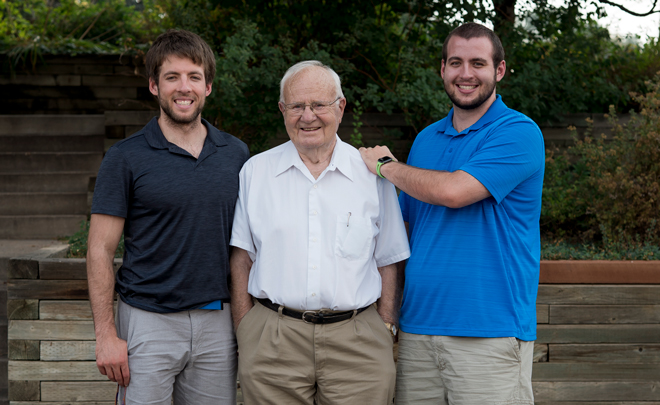
A passage in the book of James tells us it’s important for people of faith to show their faith by the way they live, the things they do.
People who know Don Schierling of Denver, Colorado, probably would tell you that biblical passage sounds like him.
Everence® recently presented Don with the 2020 National Journey Award, which recognizes people who model Christian stewardship – whose faith shines through in how they use their God-given gifts.
“Don’s life has been dedicated to social and economic justice, advocating for peace and modeling humility.” That’s one of the things people from his church – Glennon Heights Mennonite Church – said about Don when they nominated him for a Journey Award.
They added that Don shares his faith through his actions and life stories, which “are always filled with passion for others and emphasizing the good in people.”
Rhoda Blough of Everence speaks at a reception honoring Don Schierling with the National Journey Award at Don's church in Colorado. (Holly Freeman Photography)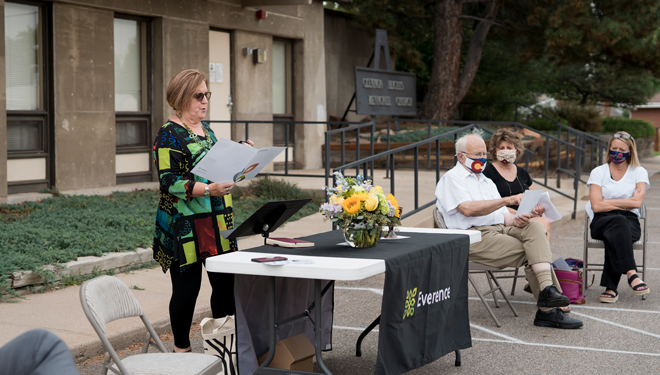
Exploring what people think
Don possesses a healthy intellectual curiosity. “He loves to ask people questions, to know what they’re thinking and why,” said Dawn Schierling -Harder, one of Don’s daughters.
“Don really loves finding ways to add value and encouragement to life, to people and the world around him,” said Pastor Ryan Koch of Glennon Heights Mennonite Church.
Don doesn’t take things at face value, the pastor said – he believes in researching and investigating.
He’s also known for being kind and smart. “He is one of the most caring people, and ridiculously brilliant and smart,” Dawn said. “My kids are always saying he’s the smartest person they know.”
Don and Brent Miller of Everence have grown close over the years. Brent counted Don and Don’s wife, Elvira, among his clients shortly after joining Everence (then Mennonite Mutual Aid) in 2002.
Most phone conversations with members last 15 minutes or so, but with Don, “we talk for an hour sometimes,” said Brent, who now serves as Managing Director for the Michiana region. “It’s always interesting – I’ve always found Don fascinating.”
Brent feels he can counsel people better if he understands their thought processes. With Don, “he was born in poverty during the Great Depression, and that influenced how he looked at things as an adult.”
Brent said, “He’s ministered to me with his perspective, how he incorporates his faith.”
Humble beginnings
Don was born in Nebraska in 1934, and his family was similar to many during the era that followed the stock market crash of 1929.
“We had nothing,” he said.
Elvira and Don Schierling at home. (Family photo)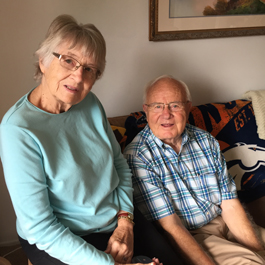
On top of an economy running on empty, a terrible drought struck the Great Plains in 1934 and ushed in the Dust Bowl era in which windstorms stripped the topsoil from millions of acres.
When Don was in first grade, his parents packed up the family in their Chevy and left Henderson, Nebraska, where there were no jobs. They headed to California, as did thousands of others from the
Great Plains as described in John Steinbeck’s The Grapes of Wrath.
Don’s father got a job in a shipyard in Long Beach. The family remained in the Los Angeles area for several years before returning to Nebraska when Don was in middle school.
Growing up in the midst of the Great Depression, Don witnessed the hard times that led to such unprecedented government programs as bank deposit insurance, Social Security for retirement income, and unemployment compensation.
Elvira and Don Schierling, on their honeymoon at Niagara Falls in 1960. (Family photo)
Don joins the Pax effort
Then came World War II, and much of Europe was devastated. While a student at Bethel College in Kansas, Don learned about Pax, a program Mennonite Central Committee launched in 1951. Pax provided service opportunities around the world, including post-World War II reconstruction projects.
Don Schierling in front of his home. (Holly Freeman Photography)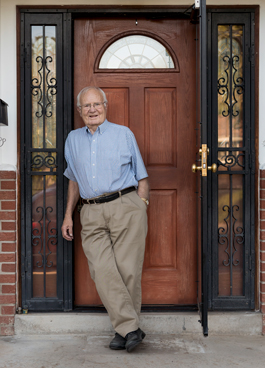
Don signed up, serving two years in Germany and Greece. He built housing in Germany and helped people in Greece learn effective farming techniques. “MCC bought us a tractor so we could loosen the soil,” Don recalled.
“I saw people who were poorer than we were – how differently people lived,” Don said.
Germany had invaded Greece in 1941, destroying about a thousand Greek villages. Thousands died of starvation or were killed by German forces determined to crush Greek resistance.
For many years, Don carried a picture of a malnourished boy he’d met in Greece. The child died, and the photograph reminded Don of how we’re all responsible for people everywhere.
Don’s experiences with Pax stuck with him. He said, “Each experience you have affects you in some way – emotionally, spiritually.”
Daughters Sonja (left) and Dawn look at photos and other mementos at Don's home. (Holly Freeman Photography)
Back in the USA
After coming back from Europe, Don lived and worked as a teacher in southwest Kansas. There, he met and fell in love with Elvira Mae Ediger, another teacher, and the couple married in June 1960.
They moved to Elkhart, Indiana, where Don attended seminary and Elvira taught home economics. But before he completed seminary training, Don was asked to head a voluntary service unit in Oklahoma City. He worked with a Catholic priest to help people in low-income neighborhoods loosen restrictions on where they were allowed to live.
Don and Elvira’s first daughter, Dawn, was born in 1966 while the couple was in Oklahoma City. Not long after that, the Schierlings moved to Chicago, where Don completed his seminary education at the University of Chicago Theological Seminary and their second daughter, Sonja, was born in 1968.
The family had a notable neighbor in Chicago – the Rev. Jesse Jackson, civil rights leader and later, a two-time candidate for president. “We saw him often,” Don said. “He came and spoke to the seminarians too.”
Don and Elvira spent several weekends listening to Jackson speak. Dawn thinks spending time with the future founder of Operation PUSH (People United to Serve Humanity) helped solidify her father’s already developed convictions about peace, justice and equality.
Getting things done in Denver
Don and Elvira moved their family to Denver, Colorado, in 1969, where Don worked with Mennonite Urban Ministries to help Mennonite congregations connect with residents of Denver’s west side.
While working with MUM, he started Brothers Redevelopment Inc., a nonprofit partnership, with two community activists and a member of a local Lutheran congregation.
Rhoda Blough of Everence, Don Schierling, Brent Miller of Everence (Holly Freeman Photography)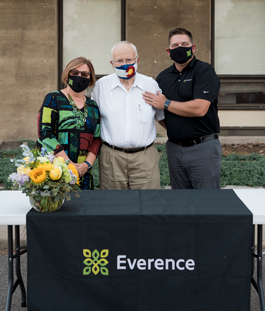
Brothers provides housing-related services such as property management, modifications/repairs and home-buying counseling. The mission is to help older adults, residents with low incomes, and residents with disabilities find affordable, safe and accessible homes.
Don said, “We started getting things done.”
Dawn describes Brothers Redevelopment as her father’s heart and soul. Even after he moved on to work elsewhere, Don remained on Brothers’ board of directors for nearly 50 years.
Don also worked for a bank, helping to revitalize neighborhoods through strategic lending; and for a nonprofit that encourages self-sufficiency in Africa, Asia and Central America through agriculture, water, sanitation and financial programs.
On top of all that, Don started teaching in the evenings at Regis University Business School in Denver in the early 1980s – and continued to do so until about 2013. “I taught business classes for working adults,” he said, as well as courses in ethics and religion.
Called to be a caregiver
After he retired from full-time work, Don and Elvira enjoyed traveling and spending time with family. In 2010, Elvira was diagnosed with Alzheimer’s disease, and Don became her primary caregiver.
AARP recognized Don and sent him to Washington, D.C., to speak up about the need for more support for family caregivers.
(Holly Freeman Photography)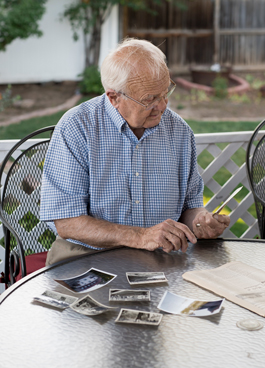
Don was on hand as the Assisting Caregivers Today caucus was launched. The bipartisan group of lawmakers from the House and Senate has helped secure more federal money for programs that aid family caregivers.
Elvira died in August 2020. She and Don were married for 60 years.
Don is one of those people who makes an impression.
“He’s a very memorable character,” Dawn says. “He just has that presence. When you meet him, you don’t forget him.”

